100 years ago, on February 27, 1919, the first issue of the first newspaper in the Abkhaz language “Apsny” was published. This day has become a professional holiday of the media of Abkhazia. For the anniversary of the legendary newspaper, the WAC has prepared an essay on the history and the present edition.
Said Bargandzhia
The anniversary issue of the newspaper “Apsny” newspaper, like 100 years ago, tells about what is happening in Abkhazia. They write what they are worried in the people's republic. However, the most important thing in this issue is the material on the first issue of the newspaper. After all, “Apsny” is a whole epoch; it is the first stone in the foundation of Abkhaz journalism and literature.
How it all began
In 1906, with the request to create a periodical in his native Abkhaz language, the national teacher Andrei Chochua addressed the representatives of the authorities. However, during the years of domination of Menshevik Georgia on the territory of Abkhazia, this seemed impossible. It was a difficult period of oppression of “the whole of Abkhaz”. Then Chochua failed to convince Tiflis (modern Tbilisi – ed.).
This happened only 13 years later with the members of the Abkhaz People's Council (APC is a local authority formed by the congress of the Abkhaz people on November 8, 1917 - ed.) Samson Chanba (Abkhaz educator, prose writer, playwright, poet, essayist, statesman and public figure, founder of Abkhaz dramaturgy – ed.), Mikhail Tsaguria (professor, prominent public figure and statesman – ed.), Dmitry Alania (state and public figure of Abkhazia, educator, publicist - ed.) and other representatives of the Abkhaz intelligentsia.
Doctor of Historical Sciences Aslan Avidzba today calls it a mystery that Gulia and his like-minded people then managed to get permission from the Georgian authorities to publish the newspaper.
“It was a time of powerlessness of the Abkhaz people, a time when the Georgian Mensheviks were outraged in Abkhazia - and then somehow it was possible to convince to create the first Abkhaz newspaper. Surely, it was not about creating a political publication in which the authors would have scolded the Georgian authorities. The permission was given to conduct educational work,” said Aslan Avidzba.
One way or another, on February 27, 1919, the first issue of the first Abkhaz newspaper in the Abkhaz language, “Apsny” (“Abkhazia” from the Abkhaz - ed.), came out of print, and the publication began to be printed on a regular basis.
That very first number contained jubilant lines written by Dmitry Gulia. He wrote that the first Abkhaz newspaper was published, which in its native language will speak about the most important, which will become the voice of the people of Abkhazia. It was a real victory.
The newspaper immediately received the approval of representatives of the then small Abkhaz intelligentsia, many of whom became the authors of publications.
Why victory?
Analyzing the articles of the “Apsny” newspaper of the first years, one can see that on its pages there were nevertheless published political materials that the Georgian authorities “scolded”, and most importantly - spoke about the sovereignty of Abkhazia. It turns out that at that time the authorities “turned a blind eye” to some publications.
Aslan Avidzba explains this by several factors. First, the historian says, by that time the most ardent opponents of Menshevik Georgia from among the Abkhaz intelligentsia had already been arrested, and it was inappropriate to spoil relations with the remaining members of the intelligentsia, and “it’s impossible to arrest everyone.” Further, the expert continues, it was the so-called “carrot” policy, “concession to the Abkhaz intelligentsia”, the desire of the Georgian Mensheviks “to show themselves in a democratic light”.
The very fact that “Apsny” was published in the Abkhaz language played a very important role: the authorities could not control all the published materials.
“In general, the creation of the “Apsny” newspaper is of enormous importance, which is difficult to overestimate - it (the creation of the newspaper – ed.) played an outstanding educational role for the Abkhaz people. It was the greatest contribution to the development of Abkhaz writing,” said Aslan Avidzba.
Debut of Abkhaz journalism
The first issues of “Apsny” indicated the “editor-group” as an editor, several people, but the main work was performed in the newspaper by the patriarch of Abkhaz literature Dmitry Gulia. He was directly involved in the collection of information, made decisions about publications, found the authors.
“Dmitry Gulia then already worked at the Sukhum teacher’s seminary,” says Vasily Avidzba, Chief Researcher of the Literature Department of the Abkhaz Institute of Humanitarian Studies named after Dmitry Gulia (ABIGI). - He often attracted his students to the writing of materials for the newspaper. In general, many of the now well-known classics of Abkhaz literature published their debut works in various issues of the “Apsny” newspaper.
Vasiliy Avidzba notes that new authors firstly made themselves known thanks to the newspaper. Later they left a noticeable mark on journalism and literature, prominent state and public figures of Abkhazia were published there.
“There is even one note by Nestor Lakoba,” says Avidzba. - Rather, it is a record of folklore text. He recorded a folk song by an old man in the village of Lykhny. Very rare text, not all words have so far been able to decipher (it is impossible to determine their meaning in view of the complexity of the language - ed.). There are also several articles by Vasily Lakoba (Abkhaz revolutionary, founder of the national liberation detachment “Kiaraz” - ed.) ”.
Relevant then and today: the topic of language preservation
The subject of the first Abkhaz newspaper can be judged by the most frequently covered issues. A significant place was given to the topics of education, enlightenment of the people, development of the national school, preservation and functioning of the native language.
The issue of preserving and developing the Abkhaz language, which is relevant today, was a hot topic 100 years ago. This is evidenced by numerous articles by the editor-in-chief of “Apsny”: Dmitry Gulia devoted more than 15 materials to this topic on the pages of the newspaper.
He wrote: “We, the Abkhaz, treat our language scornfully, do not want to develop it. Many, instead of preserving and developing their native language, say: why do we need it, what is the use of it ... And under these conditions, can our language develop? Can the language disappear?”
In the “Our time...”, article published in 1919 in 33 and 34 issues, Gulia pointed to the need for the development of the Abkhaz language because of the difficulty of its development. According to Gulia, the Abkhaz in ancient times were a large nation, had their own kings, but due to the fact that they did not create a written language, their language fell behind in its development. The Abkhaz mastered other languages and dissolved among foreign peoples.
An interesting idea on this subject is expressed by the Doctor of Philology, the leading researcher of the Department of Literature of the Peoples of the Russian Federation and the CIS, A.M. Gorky IMLI of the RAN (Russian Institute of World Literature - ed.) Vyacheslav Biguaa in his work “Publicism on the pages of the “Apsny” newspaper (1919–1921)”. He believes that Dmitry Gulia deliberately exacerbated the situation in order to “shake up” his compatriots and show them the danger of neglecting their native language.
“It is unlikely that the language was guilty of reducing the number of people; let us remember at least the XIX century, the Caucasian war that devastated the country. From my point of view, Gulia specifically aggravated the problem in order to draw people's attention to education in their native language, to eradicate in the minds of many Abkhaz a dismissive attitude towards their language,” says Biguaa.
Unfortunately, the question of preserving the Abkhaz language remains acute in our days: the Abkhaz language is “lost”. A lot of attention is still being paid to this problem today; they continue to write about it in the modern newspaper “Apsny”.
Platform for controversy and finding solutions
Politics, in particular, articles on the topic of the independence of Abkhazia, had a very special significance in the articles of “Apsny”. Of course, the representatives of the Abkhaz intelligentsia, who published their articles in “Apsny”, saw Abkhazia independent, but they had a different approach to this issue. Real battles unfolded around the issue of independence.
Samson Chanba also expressed his views on the political situation of Abkhazia on the pages of “Apsny”. His reasoning was published in one of the April issues in 1919. He noted: “Now the Georgians have seized upon statehood. All the parties, including the national-democratic party, except for one or two, united and engaged in this business. No state fulfills without land and population. Therefore, the Georgians began to expand their borders. In addition, in this situation, our little Abkhazia has become a tasty morsel. However, how can our neighbors get it? Today, it is difficult to subjugate someone if you do not master them with cunning.”
Concluding this material, Chanba noted: “We welcome the creation of the Georgian Republic, respectfully treat the Georgian self-determination and congratulate them; but we love, respect ourselves no worse than they, we sense their goal among the beautiful words - to achieve possession of Abkhazia. Therefore, we protest against them.”
Along with Samson Chanba, many representatives of the then intelligentsia expressed their position, suggested solutions, entered into acute disputes, of which “Apsny” always remained the main “platform”.
The issue of return of Abkhaz to their homeland
The return to homeland of the “hostages” of the forced resettlement of the 19th century is also one of the main topics of “Apsny”. According to Vyacheslav Biguaa, public figures and writers were well aware that the expulsion of most of the Abkhaz to Turkey in the 60s and 70s of the 19th century was the main reason for the acute weakening of Abkhazia and the Abkhaz people. “They tried to change the situation a bit, returning at least some of the deportees,” writes Biguaa.
The article dated August 28, 1920, the authorship of which has not been established, states: “For us, the Abkhaz who are in Abkhazia in their homeland, the most painful issue is that the majority of our people are far from us, in Turkey. So far, we have been silent about this, realizing that we were powerless to solve this problem.”
Analyzing this quote, Biguaa notes that with the autocratic power in the Russian Empire, which contributed to the eviction of the “recalcitrant highlanders”, it was unrealistic to solve the problem of the return of exiles to Abkhazia. Since the end of the 19th century, only a small number of families (including the family of father of Dmitry Gulia) managed to return home illegally.
In a small article, “The Committee on Mukhadzhir Affairs,” published in “Apsny” in 1920, Dmitry Gulia proposed the creation of an “Emigration Committee” that could more effectively promote the return of compatriots from Turkey. Gulia thought it was necessary to keep the land for them, choose people who would collect the necessary money, and families should be returned stage by stage (10-20 families). He expressed similar thoughts in his article “Once again on the problem of Mukhadzhirs.”
Saved jewel
Despite anyone’s desire to hush up sensitive topics, representatives of the Abkhaz intelligentsia and public figures of Abkhazia continued to write for “Apsny”. These were short notes and voluminous materials.
Already in our time, in 2006, a collection was published in the Abkhaz language in Sukhum, in which the remaining issues of “Apsny” were again published.
This reprint was the salvation of the newspaper from complete extinction, writes scientist Vyacheslav Biguaa in one of his works. After all, the surviving single copies were in a dilapidated state, were in personal archives, the newspaper’s issues were virtually inaccessible to modern readers and specialists.
Four of 85 issues in the book are missing. They tried to find them in Abkhazia, Tbilisi, Moscow, St. Petersburg and other places, but without success. Biguaa suggests that they may have been in the funds of the Abkhaz State Archive and the archive of the Dmitry Gulia’s Abkhaz Institute of Language, Literature and History. However, on October 22, 1992 (during the Patriotic War of the people of Abkhazia in 1992–1993, when Sukhum was controlled by the Georgian authorities - ed.), both research centers were deliberately burned.
Rebirth of “Apsny”
The last remaining newspaper issue dates from the beginning of February 1921.
On March 4, 1921, Soviet power was established in Abkhazia, which, of course, was reflected in the newspaper. It was renamed into “Apsny kapsh” (Red Abkhazia - ed.). Following the name, the ideology of the newspaper was changed, “it became a party one,” according to expert Vasily Avidzba. An ABIGI researcher explains that “Apsny kapsh” was not published at regular intervals. In the archives of Abkhazia there are almost no issues until the 50s.
The “Apsny” newspaper “returned” in 1991 and since then has been continuously working for its readers. The chief editor of the newspaper today is Enver Azhiba.
“We are trying to continue the traditions of the newspaper, which were laid 100 years ago by the national poet of Abkhazia Dmitry Gulia and prominent representatives of the Abkhaz intelligentsia. Just like 100 years ago, it is published on four pages. We write about what is happening in Abkhazia. We print historical materials, highlight events, write about politics, economics, and talk about people,” says the editor-in-chief of “Apsny”.
One of the main problems today, says Azhiba, is the lack of an official website.
“Media cannot exist without a website today. We hope that soon we will be able to solve this problem,” he shares.
Today the newspaper is published twice a week; its circulation is 1000 copies. Therefore, the legendary “Apsny”, which published the brightest representatives of the Abkhaz ethnos, the edition for which they fought, continues to live. The newspaper keeps the history of generations in detail, and, overcoming existing difficulties, still serves its reader.
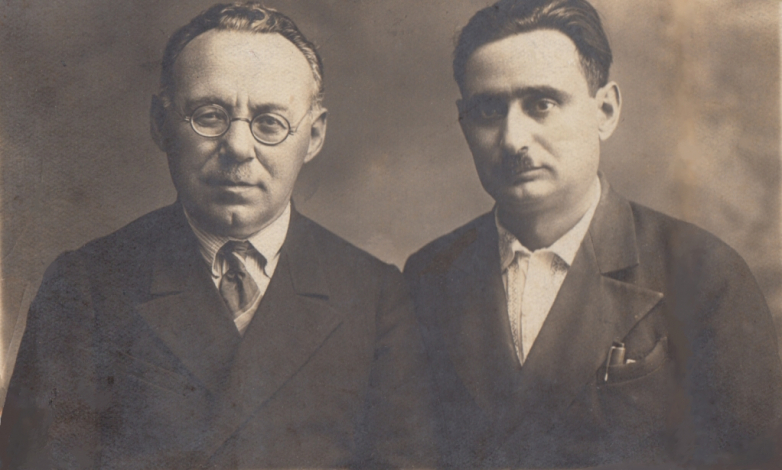
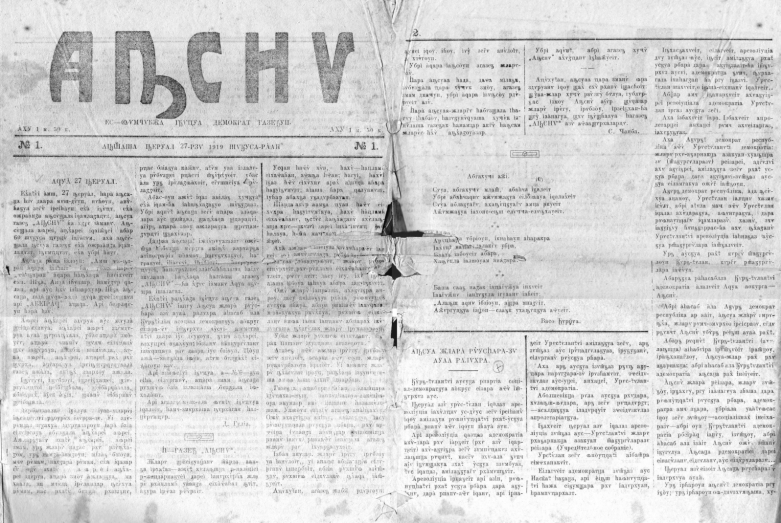
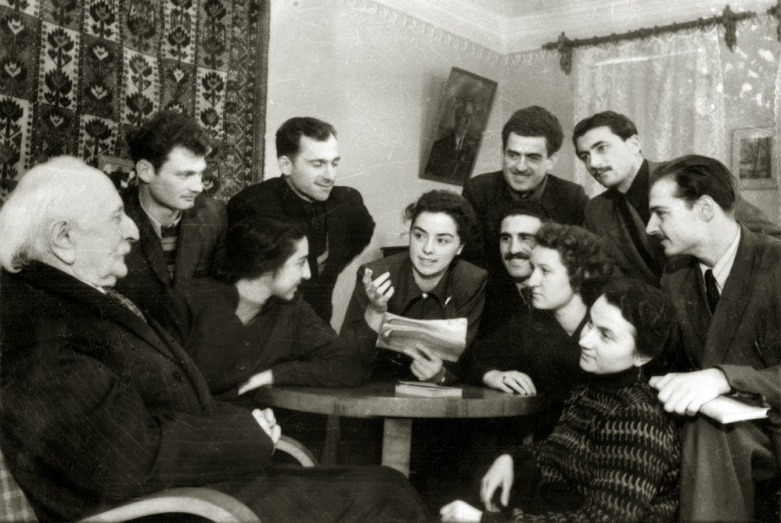
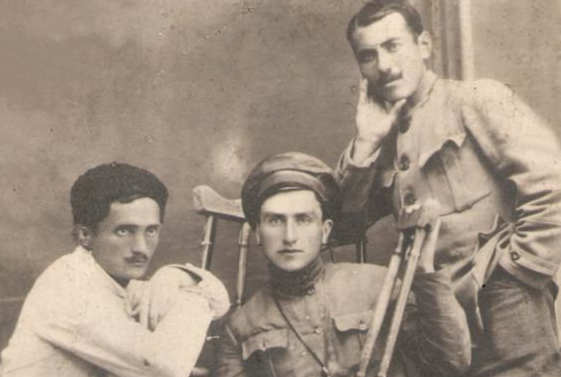
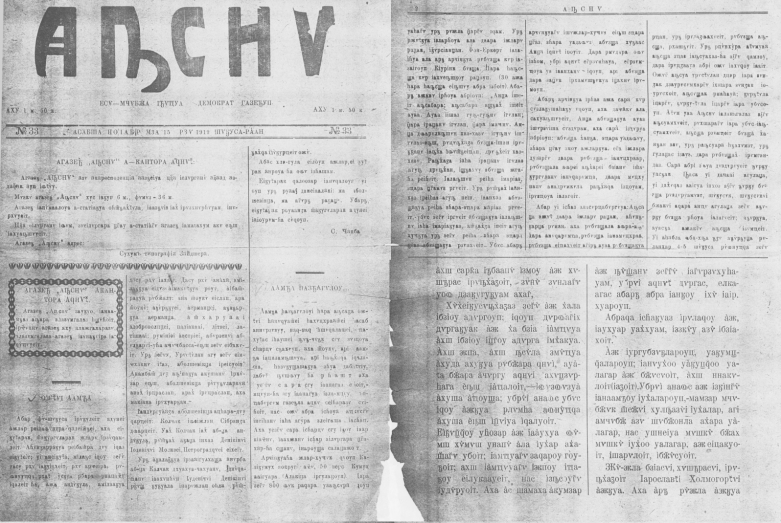
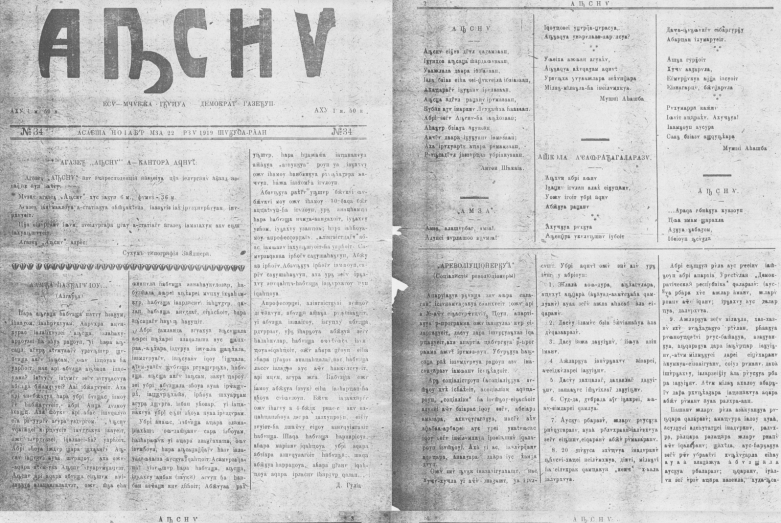
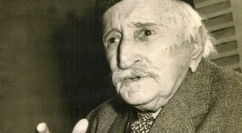
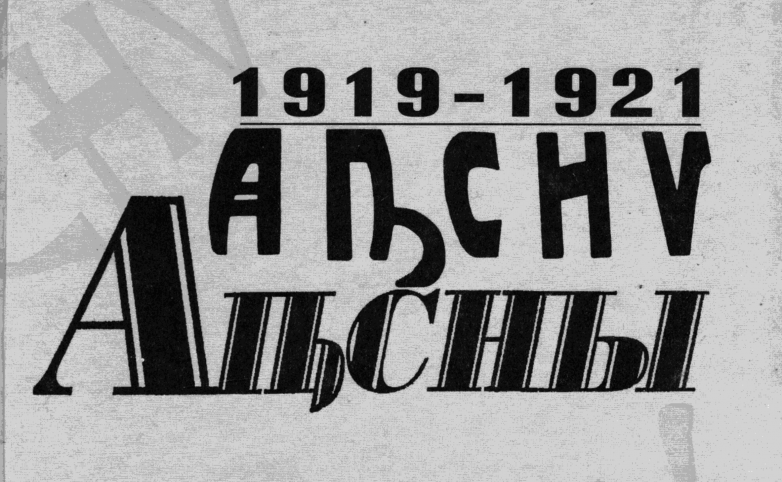
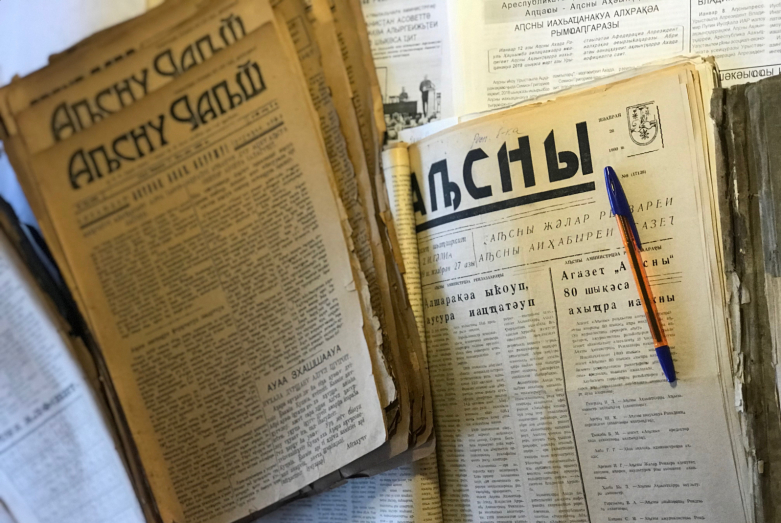
to login or register.